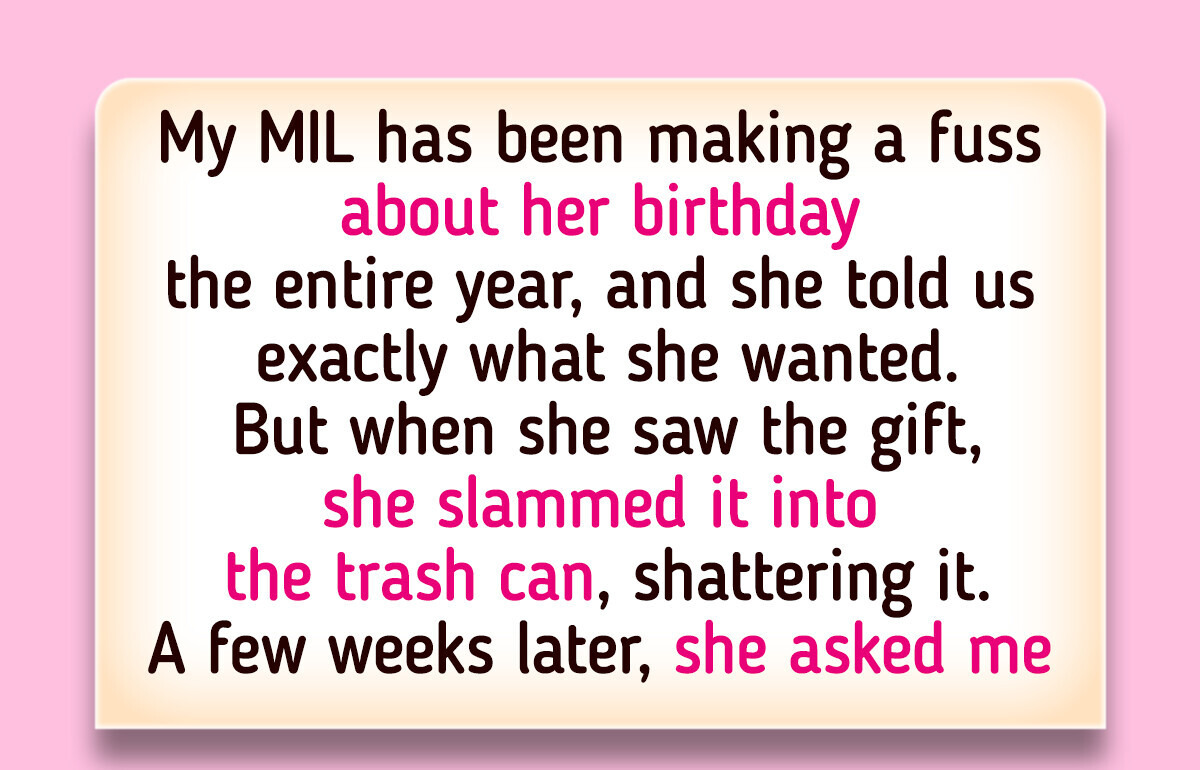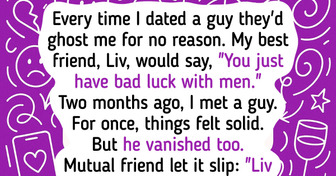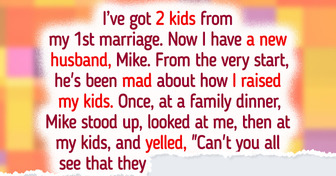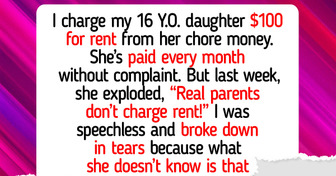Don't pay her bills, she's acting like spoiled brat. Got exactly what she wanted for bday yet tossed it out. But acting like owed $$$. They don't owe her anything
My MIL Destroyed My Birthday Gift and Now She Wants Me to Fund Her Living

One of our readers reached out to us.
My MIL has been making a fuss about her birthday the entire year, and she told us exactly what she wanted. She even sent links, specs, and “friendly reminders” in the family group chat. So my husband and I got her the exact gift she asked for—down to the color.
But when she saw the gift, she slammed it into the trash can, shattering it. She didn’t even try to fake appreciation. Just full-on rage mode like we handed her a bag of garbage. Then she stormed off, mumbling about how we were “selfish.”
A few weeks later, she asked me to help with her rent. She's acting all sweet, like the whole birthday tantrum never happened. I asked, “Are you asking me to pay your bills after you literally smashed a gift I spent my hard-earned money on?” She goes silent for a second, then sighs dramatically, “I was just disappointed that you didn’t put more thought into it.”
I nearly threw my phone. I said that maybe if she hadn’t shattered her birthday present in a fit of entitlement, she’d have more goodwill from me. She huffed, called me disrespectful, and hung up.
Now she’s running to the rest of the family, painting me as the villain. I’m getting texts saying, “But she’s family!” and “She’s an elder!” No, she’s an adult who made a choice.
Thank you for sharing your story. Such cases can be tough and may make you wonder if you have taken the right path. Here on some tips that might help if you find yourself in a situation like this one.
Set clear boundaries.
It’s easy to feel obligated to help family, but the truth is, you are not responsible for fixing someone else’s bad decisions or entitled behavior. If someone disrespects you and then turns around asking for favors, it’s important to set firm boundaries. Let them know that their actions have consequences, and make it clear what you will and won’t tolerate. If they continue to overstep, it may be time to reduce contact.
Stay firm, but calm.
People like this often thrive on drama, so staying calm takes away their power. Instead of engaging in an emotional back-and-forth, respond with neutral, firm phrases like:
- “That doesn’t work for me.”
- “I’m not able to help.”
- “I’ve already made my decision.”
The less you feed into their reaction, the more control you keep over the situation. They may try to escalate, but the key is to stay unshaken.
Avoid playing into guilt trips.
Toxic family members are masters at manipulation. They’ll bring up how much they’ve “done for you” in the past, how “family helps family,” or even try to get others involved to pressure you. Don’t fall for it.
Remind yourself that guilt is their tool, not your burden to carry. If they’re running to others to badmouth you, let them—people who truly care about you will see through the manipulation.
Know when to walk away.
Some people will never change, no matter how much you try to set boundaries or reason with them. If a family member continues to disrespect you, drain your energy, and bring nothing but negativity into your life, it’s okay to step back. Limiting or cutting contact doesn’t make you a bad person—it means you’re prioritizing your own well-being. Sometimes, the best way to deal with this kind of behavior is to remove yourself from the situation entirely.
At the end of the day, relationships require mutual respect. No one is obligated to tolerate this kind of behavior just because “family is family.” Respect is earned, not demanded, and when someone repeatedly crosses the line, it’s only natural to set boundaries.
Comments
Related Reads
My Best Friend Betrayed Me in the Worst Possible Way, but Karma Had My Back

I Checked Our Security Camera After Leaving My Newborn in the Care of My Sister-in-Law

My New Husband Publicly Shamed My Kids, I Made Him Taste His Own Medicine

13 Family Stories That Are Haunting People More Than Their Bank Loans

I Gave Up My 2-Month-Old Baby for Adoption Because I Chose My Own Happiness

15 Stories That Show Kindness Is a Quiet Language the World Needs

15 Stories That Show Quiet Kindness Is the Strength the World Needs Most

I Demand That My 16 Y.O. Daughter Pay for Rent and Groceries, Nothing in Life Is Free

I Refuse to Return to the Office After My Coworker’s ‘Prank’ Revealed His Darkest Secret

10 Hospital Workers Who Prove Kind Heart Is a Powerful Medicine

I Thought My Ex Was Finally Stepping Up for Our Son—Then I Discovered the Humiliating Truth

17 Moments That Prove Kindness Is the Strongest Payback




